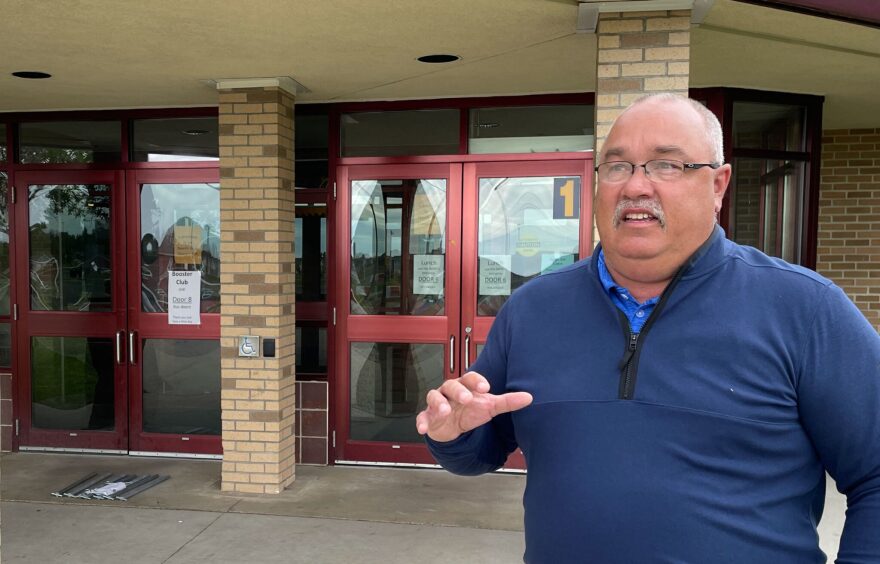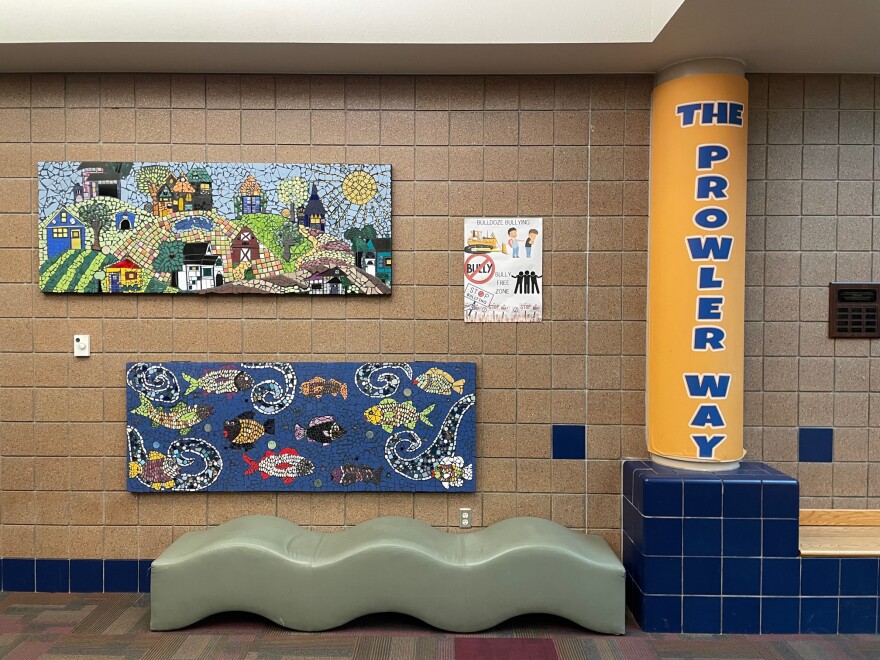THIEF RIVER FALLS — On the surface, it looked like any other school fundraiser. The kids at Challenger Elementary in Thief River Falls were selling coffee cups, writing thank-you notes, and partnering with local businesses to drum up interest in their cause.
But these kids weren’t fundraising for a class trip, a sports team, or any other extracurricular activity. They were trying, instead, to raise $70,000: The cost of saving an entire third grade classroom from the budgetary ax.
The budget crunch in Thief River Falls underscores the challenges facing districts throughout greater Minnesota: They need increasingly skeptical, aging residents to vote for higher taxes in an era of rising attacks on public schooling in the national media.
Trouble in Thief River
The district, in northwest Minnesota, had been in financial trouble for several years. Its voter-approved operating levy expired in 2021, making it one of the relatively few districts in the state without one. The levies provide additional funding beyond the money districts receive from state and federal sources.
After voters in the staunchly conservative area overwhelmingly rejected a new operating levy in 2021, the district tried again in the fall of 2023, this time with the help of an organized campaign to spell out the stakes to skeptical voters. That one failed too.
After several years without a levy in place, there was only one way forward: steep budget cuts, resulting in the layoffs of 10 teachers.
Some of the reductions would be severe. Third grade classrooms at the elementary school would balloon to 30 kids, almost 50% more than the statewide average. That’s when the student fundraisers stepped in.
“I grew up here and have taught here for over 20 years,” said Courtney Skjerven, the technology teacher who spearheaded the effort. “With our design software and resources we have run a mock business the last few years to create things for people by request.”
The students could use the skills they picked up in Mr. Skjerven’s class to create tumblers, keychains and other items to sell to save a third-grade classroom.
In March, the effort formally kicked off.
But would the community that had twice rejected a school operating levy support it?
Funding challenges

Thief River Falls Superintendent Chris Mills speaks at Challenger Elementary School on July 1, 2024 (Christopher Ingraham/Minnesota Reformer) Thief River Falls superintendent Chris Mills says a combination of factors, including declining enrollment and a difficult local tax environment, are driving the ongoing troubles. “We have declined 200-plus students in the past five years and we project to decline an additional 200 students in the next five years,” he said.
The population is getting older, and the younger families that remain in the town of roughly 9,000 people are having fewer children. While major local employers like electronics manufacturer Digi-Key have expanded in recent years, some of the families that came to town either choose to live in nearby communities or send their kids to private schools.
There’s also a perception among some in the community that their taxes are already too high. In 2016, for instance, the county approved a $17 million expansion to the local jail and courthouse. Voters didn’t get a direct say in that decision, which resulted in increased property taxes.
“I believe the biggest issue in our community is that property taxes are viewed as out of control,” Skjerven said. “The only available option community members have to take a bit of control of their property taxes is to vote no on school levies.”
About two-thirds of Minnesota school districts, including most of the districts surrounding Thief River Falls, have some sort of operating levy in place.
“One of the big inequities in Minnesota school finance is a district’s reliance on the operating referendum,” according to the Minnesota Rural Education Association, which advocates for rural districts. “The simple fact is that some districts have an easier time of passing referendums than others, and the money involved is substantial.”
School districts across the state are facing funding crunches as COVID-19 aid winds down and enrollment in many places decline. While the Legislature approved a major increase in state funding in 2023, some of that money has gone toward new mandates — like universal free school meals — rather than ongoing expenses.
“The state of Minnesota has created a funding system of haves and have-nots across our state,” Mills said. “It is truly disappointing to see the amount of policy and mandates that continue to be put in place while no funding follows.”
Schools looking for local sources of funding are facing increased levels of opposition from outside groups, particularly from those with ideological axes to grind.
While there was no organized opposition to Thief River Falls’ latest levy attempt, Skjerven says he’s seen local voters taking cues from national education controversies that have nothing to do with the district.
“People aren’t as involved with their local schools as they were in the past, so some are taking what they see and hear [in the national media] and projecting these issues on their local schools,” he said. “I think a lot of people forget that most of our teachers are their lifelong neighbors, relatives, and friends of families.”
A successful campaign
By the end of the school year, the fundraising drive had proved to be a success. The students raised over $70,000, although the school will have to pay sales tax on most of the money they brought in.
Skjerven said it was a major undertaking.
“You probably wouldn’t believe how many hundreds of hours I personally put in, if I told you,” he said. The students also put in countless hours of their own labor.
The district is moving forward with yet another ballot measure this fall. At least nine additional full-time teaching and staff positions are at stake, on top of the jobs already cut. “We are working diligently with our staff and the local Vote Yes group to communicate and engage our public,” Mills said.
Skjerven is hopeful as well. “I want to see people feel ownership in pride in their community schools again,” he said. “We as educators need to find ways to authentically make families and community members feel like they are part of us.”
If the levy doesn’t pass, Skjerven doesn’t know that they’ll be able to save another classroom. “I don’t think I can do that again,” he said.
Minnesota Reformer is part of States Newsroom, a nonprofit news network supported by grants and a coalition of donors as a 501c(3) public charity. Minnesota Reformer maintains editorial independence. Contact Editor J. Patrick Coolican for questions: info@minnesotareformer.com. Follow Minnesota Reformer on Facebook and X.







